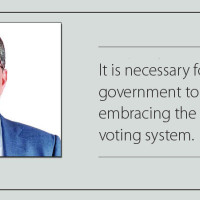- Wednesday, 11 February 2026
Vital Clues For Rastriya Swatantra Party
There was a time when capturing of state power had been the ideological refrain posited and upheld by almost all communist parties in Nepal. Anything less than that used to be flayed as reformism or revisionism characterised by abandonment of the revolutionary ideals propounded by Marx and Lenin. It used to be labelled as a compromise on the revolutionary narrative of Marxism. The Maoists in Nepal raised arms to capture the state through recourse to the means of armed conflict which is euphemistically called ‘people’s war’ during the last decades. Leftist narratives held appeal among the larger segment of people over the years. Dominant section of the people allowed themselves to be indoctrinated, mobilised under the communist banner. Needless to say, around seventeen thousand people lost their lives in the armed insurgency.
But now those who preached and expounded the notion of armed conflict to capture state power have changed their strategy, and reconciled to participate in the course of winning power through democratic means. The communist narratives that were spun around the notion of class struggle, contradiction among social classes and forcible seizure of state power hold no relevance, acceptance and meaning today. The futility of the doctrine of forcible seizure of state power has been realised by the communist ideologues and their party documents also attest to this fact.
Democratic strategy
In fact, liberal democracy and plural political order have triumphed today weakening the hold of communist ideology and power monopolism. Today new political groups branding themselves as alternatives have stolen the public show posing challenges to both left and right ideology. These groups do not pursue and preach the notion of capturing state as communists did in the past. They, instead, advocate for changing the nature of state through democratic strategy and democratisation of state agencies. The rise of the new groups generally mans a new generation of the people which is not the case of Nepal alone. Many countries in the West including India have witnessed the rise of such groups declaring themselves as democratic alternative to the traditional political parties. These new groups are neither leftists nor left of the centers in their political orientation, formulation and outlook.
They claim to be more pluralist, democratic and citizen centric on top of that delivery oriented. Their contention is that the traditional democratic parties have become illiberal, undemocratic and corrupt in their conduct and behaviour. The new groups claim to be less ideological but more practical and delivery centric. The new groups talk about changing the nature of state power arguing that the state needs to be further democratised and made accountable and transparent. As most of the state institutions, according to these groups, have become dysfunctional and irresponsive, there is a need to restructure and revamp legislative, executive, administrative, judicial and law enforcing institutions.
Almost twelve years ago when formation of Aam Aadmi Party (AAP) was being contemplated in India, a concept note prepared by the proponent of the new political formation made an analysis of the existing political parties in India. The concept note stated “Almost all existing political parties are top-down organisations, claiming monopoly of truth, undemocratic and non-transparent in their functioning, controlled by a family or a clique and dependent on large amounts of illicit funds. A new political force has to search for an alternative to this dominant form of a political party. We would strive to learn from the rich experience of social and political movements that have attempted to create alternative politics in the electoral and non-electoral domain.
The new party should provide a political alternative that will be realised through an electoral revolution to democratise and decentralise power, and make the power structures more transparent and accountable to the people.” This is more or less true with the existing political parties in Nepal. New political formations in Nepal claim to represent the new version of democratic politics as outlined in the AAP concept note. The new formation has been able to charm the people frustrated and disappointed with the prevailing old order politics in the country. So far it is felt that the main agenda especially Rastriya Swatantra Party (RSP) led by Rabi Lamichhane seems to be attacking other parties so as to put themselves in a positive portrayal.
Ideological polemics
The existing parties that have ruled Nepal for several decades like the Nepali Congress, CPN-UML, CPN-Maoists are liable to be criticised and mercilessly attacked for their failures to deliver. But the new parties that claim to be alternatives have to be different and focus on to walk the talk. In fact, ordinary people do not have much concern in whether the party is left, right or centrist. It is learnt that RSP is engaged in writing its position document to clarify its stance on several national and international issues. Such a framework document is needed. But it should be careful not to embroil into ideological polemics as the constitution of Nepal offers basic framework for fundamental rights of the citizens which is sufficient for the parries to deliver. What matters to the people is how politics can contribute to make their lives better.
Moreover, RSP alone will not be able to break systematic corruption and governance malaises in the absence of adequate resources, a wider network of political forces and independent citizens vouching for alternative political strategy. Only a greater alliance of alternative forces could loosen the current parties’ grip on power. The common goal must be to eradicate systemic corruption and governance weaknesses, and the agenda must be to truly be committed to serve people. The alternatives should move carefully in a concerted fashion so that they can offer electoral competition to the traditional parties in the next election to be held in 2084 BS.
(The author is presently associated with Policy Research Institute (PRI) as a senior research fellow. rijalmukti@gmail.com)
















